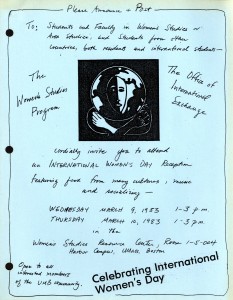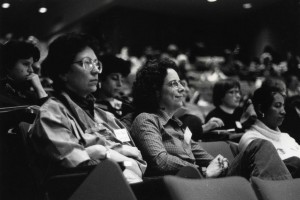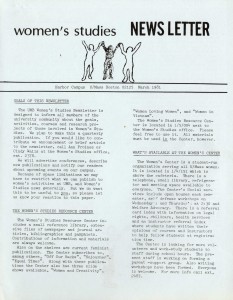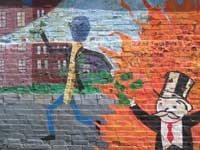
This photograph from an article by Jen Douglas about gentrification in Jamaica Plain, shows Matchstick Man to “symbolize the landlords who burned buildings they found insufficiently profitable” and “Monopoly Man … proudly admiring his acquisitions with the fires literally behind him.” Photo credit: Diana Shoberg (2004).
The most recent issue of the Trotter Review, now available on ScholarWorks, explores issues of gentrification and dispossession. As Barbara Lewis, the director of the William Monroe Trotter Institute at the University of Massachusetts Boston, writes in her introduction to this issue of the journal, this issue of the Trotter Review explores “gentrification and its alternate, dispossession, through the lens of housing policy focused on increasing opportunity; as a strategy of neighborhood displacement; as possible collusion between developers, politicians, and members of an African heritage leadership class eager to keep their pockets jingling with gold; and as local examples of ouster and remake of a neighborhood to suit the tastes of a more moneyed population with a creamier complexion.”
The Trotter Review has been published since 1987 by the William Monroe Trotter Institute at the University of Massachusetts Boston. Full issues of the Review are available on ScholarWorks, the open access institutional repository for scholarship and research out of UMass Boston.
Apart from an introduction by Barbara Lewis, the contents of this issue, titled “Place in the Neighborhood: Pushed Out, Pushing Back,” include:
- “Communities of Opportunity: Pursuing a Housing Policy Agenda to Achieve Equity and Opportunity in the Face of Post-Recession Challenges” by Kalima Rose and Teddy K?-Nam Miller.
- “Gentrification as Anti-Local Economic Development: The Case of Boston, Massachusetts” by James Jennings
- “The Politics of Race, Class, and Gentrification in the ATL” by Keith Jennings
- “From Disinvestment to Displacement: Gentrification and Jamaica Plain’s Hyde-Jackson Squares” by Jen Douglas
- “Community Land Trusts: A Powerful Vehicle For Development without Displacement” by May Louie
- “‘Separatist City’: The Mandela, Massachusetts (Roxbury) Movement and the Politics of Incorporation, Self-Determination, and Community Control, 1986–1988” by Zebulon V. Miletsky and Tomás González
- “Uncovering the Buried Truth in Richmond: Former Confederate Capital Tries to Memorialize Its Shameful History of Slavery” by Howard Manly
- “Book Review: Desire and Disaster in New Orleans: Tourism, Race and Historical Memory by Lynnell L. Thomas” by Casey Schreiber
To view the full issue, and to explore back issues of this publication, click here.
ScholarWorks is the University of Massachusetts Boston’s open access institutional repository for scholarship and research. ScholarWorks is a publishing platform, a preservation service, and a showcase for the research and scholarly output of members of the UMass Boston community. ScholarWorks is a service of the Joseph P. Healey Library at UMass Boston.
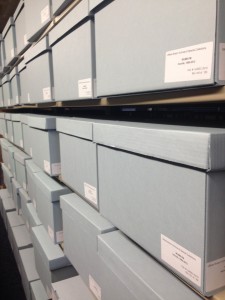




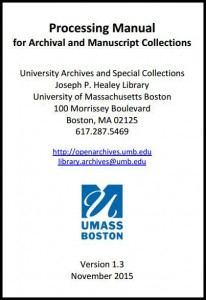
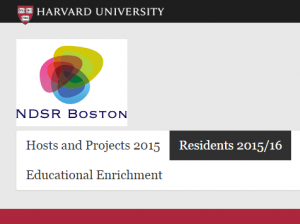 Guest post by Jeffrey Erickson
Guest post by Jeffrey Erickson The Mass. Memories Road Show (MMRS) is an ongoing community-based digital humanities project conducted by UMass Boston since 2004. The goal of the project is to collaborate with Massachusetts cities and towns to organize community-building events where images and stories that document the history of Massachusetts through the eyes of its residents are collected one town at a time. To learn more about the Mass. Memories Road Show project,
The Mass. Memories Road Show (MMRS) is an ongoing community-based digital humanities project conducted by UMass Boston since 2004. The goal of the project is to collaborate with Massachusetts cities and towns to organize community-building events where images and stories that document the history of Massachusetts through the eyes of its residents are collected one town at a time. To learn more about the Mass. Memories Road Show project, 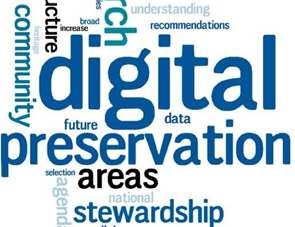 So, why should you be interested in my project? The answer is two-fold:
So, why should you be interested in my project? The answer is two-fold:
